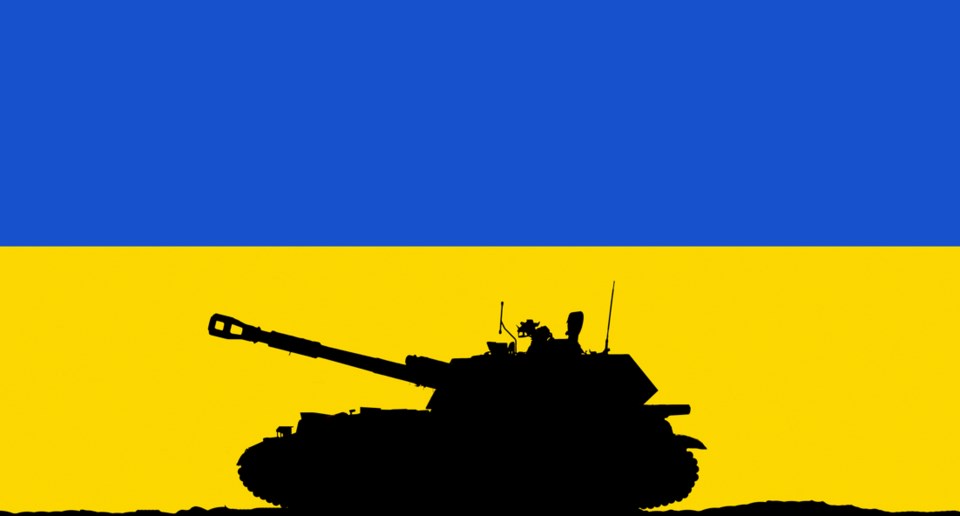The past couple of weeks have given Canadians an opportunity to follow an international story that is not related to the COVID-19 pandemic or to political theatre in the United States.
Russia’s invasion of Ukraine, which began on February 24, has compelled Canadians of all backgrounds to review their knowledge of geography and seek credible sources of information.
When Research Co. and Glacier Media asked Canadians last weekend about the unfolding situation, two-thirds (66%) said they were following news stories related to the international crisis between Ukraine and Russia “very closely” or “moderately closely.”
Men are more likely to be paying attention to this particular conflict than women (75% to 62%). Canadians aged 55 and over are significantly more likely to be tuning in to news about what is transpiring in Ukraine (75%) than their counterparts aged 18 to 34 (62%) and aged 35 to 54 (60%).
In Canada, where more than 1.25 million inhabitants identify as Ukrainian, the invasion takes on a different meaning than in other parts of the world. Interest in the crisis is significant across the entire country, starting at 63% in both Alberta and Atlantic Canada and climbing to 65% in Ontario, 66% in British Columbia, 69% in Quebec and 71% in Saskatchewan and Manitoba.
It has not been usual in recent years to see two-thirds of Canadians paying close attention to a developing news story. The proportion is smaller to the level of interest in the protests and blockades related to the COVID-19 pandemic that Research Co. reported last month (81%). Still, more Canadians are following the crisis in Ukraine than those who were interested in the arrest of Huawei Technologies Co. Ltd. chief financial officer Meng Wanzhou in February 2019 (43%) or those who paid attention to stories related to “birth tourism” in August 2020 (41%).
When Canadians are asked what the position of the federal government should be on this international conflict, more than half of respondents (53%) believe Ottawa should “definitely” (34%) or “probably” (19%) support Ukraine. About a third of Canadians (32%) believe it would be best for the federal government to do nothing or avoid getting involved.
While 13% of Canadians are undecided on this question, only 1% openly suggest that Ottawa should side with Russia. This is not a surprise, due both to the recent actions of the regime and the attitudes that Canadians had already developed. In December 2020, only 24% of Canadians had a positive view of the Russian Federation. Only Saudi Arabia (23%), China (20%), Iran (16%) and North Korea (14%) ranked lower.
Most demographic components of Canada are united in furthering the cause of the invaded party. Three in five men (60%) and practically half of women (49%) believe the Canadian federal government should support Ukraine at this moment.
More than two-thirds of Canadians aged 55 and over (68%) call for Ottawa to support Ukraine, while only one in five (21%) would prefer to do nothing. The perceptions are more nuanced among younger residents of the country. Canadians aged 35 to 54 prefer backing Ukraine to neutrality (49% to 35%) while the numbers tighten considerably among those aged 18 to 34 (43% are in favour of supporting Ukraine, 41% would avoid involvement).
Majorities of Canadians across all regions believe taking a stand for Ukraine is the desired course of action at this time. There is some fluctuation across the political spectrum. About two-thirds of Canadians who voted for the New Democratic Party (NDP) and the Liberal Party in last year’s federal election (67% and 65% respectively) believe Ottawa should back Ukraine. The proportion drops to 53% among Canadians who cast ballots for the Conservative Party in 2021, with more than a third of them (36%) pleading for neutrality on this matter.
The recent actions of the federal government have not gone unnoticed. More than half of Canadians (52%) agree with Prime Minister Justin Trudeau’s decision to provide support and a loan to Ukraine and establish economic sanctions against Russia. About a third of Canadians (32%) disagree with this course of action, a proportion that rises to 44% among Conservative voters.
It is way too early to tell what the final ramifications of this conflict will be. Measuring sentiments during a war is complex and challenging. Surveys are always a snapshot in time, and people may switch positions as the conflict develops. Still, it is fair to say that Canadian public opinion is not on the side of the aggressive party. If anything, those who are unable to endorse the federal government throwing its weight behind Ukraine mostly advocate for neutrality and not Russia.
Mario Canseco is president of Research Co.
Results are based on an online study conducted from February 25 to February 27, 2022, among 1,000 adults in Canada. The data has been statistically weighted according to Canadian census figures for age, gender and region. The margin of error, which measures sample variability, is plus or minus 3.1 percentage points, 19 times out of 20.




